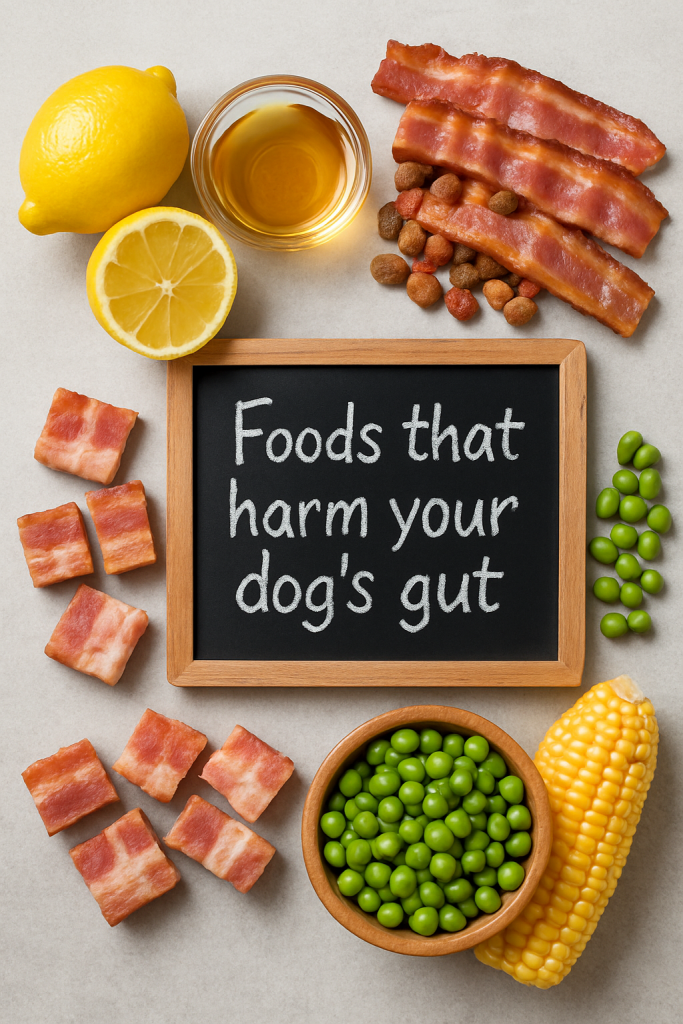Your dog’s gut health plays a central role in immunity, energy, and mood. While some human foods can damage the intestinal tract, others can support and even heal it. Let’s look at what to avoid and which everyday foods can boost gut resilience.
Foods That Harm Your Dog’s Gut Health
Highly Acidic Foods (Citrus, Apple Cider Vinegar)
Foods like lemon and other citrus, or apple cider vinegar, may seem healthy to us—but they can irritate dogs prone to acid reflux. These acidic ingredients can trigger stomach upset, increased reflux, and discomfort.
High‑Fat and Greasy Ingredients (e.g. Bacon)
Treating your dog with fatty human food like bacon can lead to serious gut issues like pancreatitis. High-fat meals force the pancreas to overwork, possibly causing vomiting, diarrhoea, and long-term intestinal irritation.
Ultra‑Processed Kibble and Artificial Additives
Many commercial kibbles undergo heavy processing and contain synthetic colours, preservatives, and fillers. These additives can disrupt digestive balance, trigger inflammation and harming the gut flora.
Low‑Quality Carbohydrates (Corn, GM Grains)
In low-grade dog foods, corn often appears as a main ingredient. It’s hard for many dogs to digest, and if genetically modified, may contain residues of herbicides. These carbohydrates can stir digestive discomfort and compromise nutrient absorption.
Legumes, Especially Peas (Phytates, DCM Risk)
Peas and legumes contain phytates that bind nutrients and reduce absorption. In some cases, diets rich in peas have been linked to dilated cardiomyopathy in dogs. They’re also harder to break down, leading to gas and bloating.
How Harmful Foods Disrupt the Microbiome
- These foods act like antibiotics, wiping out beneficial gut bacteria.
- That imbalance leads to inflammation, chronic vomiting, or diarrhoea.
- High-fat or irritating carbs may spark pancreatitis or malabsorption, exacerbating gut disease.
Transition to Healing Foods
Swapping harmful items for gut‑friendly alternatives introduces anti‑inflammatory, prebiotic nutrients. The foods below help rebuild good bacteria and soothe irritation.
Gut‑Friendly Human Foods for Dogs
Raw Local Honey
A tiny daily spoonful (¼ tsp per 10–20 pounds of body weight) offers natural prebiotics, the enzyme amylase to break down carbs, and antibacterial properties to keep gut pathogens in check. It’s also soothing if your pup has a mild cough or mouth irritation.
Fresh Ginger
A teaspoon slice of ginger steeped in a cup of water makes an alkaline, anti-nausea drink. It helps break down proteins (thanks to protease) and calms acid reflux and gut discomfort—especially when paired with a little honey.
Bananas & Apples
Bananas provide amylase and are highly alkaline—gentle on acid‑sensitive stomachs. Apples offer fiber and anti-inflammatory polyphenols like quercetin in the peel. Both support gut regularity and should be given in moderation (around ¼ banana or apple per 20 lbs body weight).
Cucumbers & Kale
Cucumber’s high-water content keeps your dog hydrated and helps dilute stomach acid, while its fibre supports digestion. Kale is packed with flavonoids, insoluble fibre, and unique sugars that act as prebiotics. Start small: a teaspoon of chopped kale per 10 lbs body weight.
Unsweetened Natural Yogurt
Choose plain, unsweetened yogurt with live cultures (lactobacillus and bifidobacteria). Around one teaspoon per 10 lbs body weight offers probiotic support to tame diarrhoea or yeast flare‑ups and enhance beneficial gut bacteria.
Sweet Potato
Rich in fibre and antioxidants like anthocyanins, sweet potato supports regularity and reduces inflammation. Serve a tablespoon per 20 pounds body weight—ideal for dogs with IBS or IBD concerns.
Ground Flaxseed
Just ¼ teaspoon per cup of food delivers fibre, omega‑3 fatty acids, and lignans—compounds with anti‑cancer and anti‑inflammatory effects. Flax helps with regular bowel movements and is especially helpful for dogs with chronic anal gland issues.
Bonus: Canned Pumpkin
A gentle fibre powerhouse, pumpkin helps bulk up stool for constipation or loose guts. It also provides beta-carotene, an antioxidant that eases gut inflammation. Use a tablespoon per 20 lbs body weight daily for best results.
How to Safely Introduce These Foods
- Start with tiny amounts and gradually increase.
- Stick to portion guidelines based on your dog’s weight.
- Monitor for gas, diarrhoea, or allergies.
- Pair healing foods with meals and avoid introducing multiple new items at once.
Benefits for Dogs with Specific Gut Conditions
Dogs with acid reflux, IBS, IBD, or food sensitivities may see improvements in digestion, appetite, and stool quality. The right foods can calm inflammation, support balanced gut flora, and reduce discomfort.
Frequently Asked Questions
Can I give honey daily to my dog?
Yes—if raw and local, a tiny amount (¼ tsp per 10–20 lbs) is safe and supportive for gut and oral health.
Are bananas or apples better for digestion?
Bananas offer enzyme support and alkalinity, while apples provide fibre and anti‑inflammatory polyphenols. Both can be safely rotated.
Can dogs eat yogurt every day?
Plain unsweetened yogurt with live cultures is generally safe in moderation (about 1 tsp per 10 lbs) and can help manage diarrhoea and support gut flora.
Is sweet potato safe for dogs with IBD?
Yes—its fibre and anti-inflammatory nutrients make it a gentle choice. Start with small portions based on weight.
Why avoid peas or legumes in dog food?
They contain phytates that may block nutrient absorption and have been associated with heart conditions like DCM in some dogs.
Can flaxseed really help with anal gland issues?
Yes—its fibre aids regular bowel movements, while omega-3 and lignans reduce inflammation in the anal gland area.
Conclusion
Understanding foods that harm your dog’s gut health, and the foods that heal empowers you to make diet choices that strengthen canine digestion. Avoid highly acidic, fatty, processed, or legume-heavy items. Instead, introduce nourishing human foods like honey, ginger, fruits, vegetables, yogurt, sweet potato, flax, and pumpkin to support gut health. Always introduce new foods gradually and consult your vet if your dog has known gut issues. Here’s to a happier, healthier gut for your furry companion!


